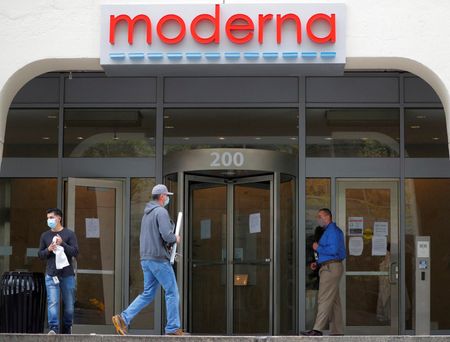By Blake Brittain
(Reuters) – Despite the backing of the U.S. government, Moderna Inc on Friday failed to persuade a federal judge it should not have to face a patent lawsuit over its COVID-19 vaccine and that the United States should have been sued instead.
U.S. District Judge Mitchell Goldberg ruled for the second time that Moderna had not yet shown that the government was the proper target of a lawsuit by Arbutus Biopharma Corp and Genevant Sciences GmbH.
A spokesperson for Genevant declined to comment on the decision. Representatives for Moderna, the U.S. Food and Drug Administration and the U.S. Department of Health and Human Services did not immediately respond to requests for comment Friday.
Warminster Township, Pennsylvania-based Arbutus and Genevant — a joint venture between Arbutus and Roivant Sciences Ltd — sued Cambridge, Massachusetts-based Moderna for patent infringement last year, seeking royalties from Moderna’s multi-billion-dollar COVID vaccines.
Moderna asked the court to dismiss the case last May. It said the United States was the proper target of the claims because the company made its vaccine for the government’s nationwide vaccination effort, citing a law that was previously used to keep patent disputes from interfering with the supply of war materials during World War One.
Goldberg first ruled against Moderna in November. He said Moderna had not yet shown that the shots were made “for the government,” and that the government may have been an “incidental beneficiary” instead.
The U.S. Justice Department said in a court filing last month that it supports Moderna’s position, arguing that the company should not be liable for shots provided under its contract with the government as part of Operation Warp Speed.
Goldberg ruled Friday that Moderna’s request was still premature and said details were still emerging about the scope of the company’s government agreements.
The case is Arbutus Biopharma Corp v. Moderna Inc, U.S. District Court for the District of Delaware, No. 1:22-cv-00252.
(Reporting by Blake Brittain in Washington)



